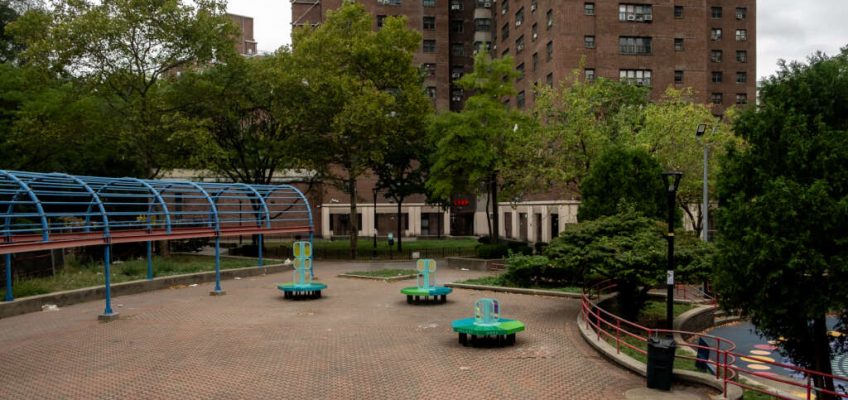“We cannot allow proposed cuts to HUD and Section 8 to devastate our communities. These aren’t abstract budget items—they represent the homes and futures of real people we work with every day.”
NYCHA’s Polo Grounds Houses. (Adi Talwar for City Limits)
As we commemorate Fair Housing Month this April, we stand alongside thousands of public housing residents fighting for their homes and their rights. We’ve walked through aging NYCHA buildings with Community Voices Heard (CVH) Power members like Ms. Barbara, who has lived in the Polo Grounds Towers for over 20 years. She shows us the persistent leaks, the mold growing on the walls, and explains how she organizes her neighbors to demand basic repairs. Despite these challenges, she proudly calls public housing home—it’s where she raised her children.
In February, the U.S. Department of Housing and Urban Development (HUD), alongside the new Department of Government Efficiency (DOGE), terminated 78 grants in 33 states totaling more than $30 million that provided funding for fair housing organizations. Stories like Ms. Barbara’s remind us why we cannot allow proposed cuts to HUD and Section 8 to devastate our communities. These aren’t abstract budget items—they represent the homes and futures of real people we work with every day.
At Community Voices Heard Power, our members know the life-changing power of stable, affordable housing – because they’ve experienced it personally. They also know the constant anxiety of threatened funding cuts. During our monthly meetings in Harlem, Yonkers, Newburgh, and Poughkeepsie, we hear from residents like Nola, a retired senior who worked at the Department of Justice and has been a resident of public housing in Newburgh for 24 years. And from Maria, who is the President of her Tenant Association at UPACA 6 in Harlem, and has lived in public housing since 1964.
These CVH Power members aren’t just beneficiaries of housing programs—they’re powerful advocates who travel to Albany and Washington to testify about the critical importance of these investments. This year, CVH Power organized hundreds of tenants who boarded buses at dawn to make their voices heard at the state capitol. They understand that when we talk about HUD funding, we’re talking about their homes, their communities, and their lives.
The numbers behind these human stories are equally compelling. Even before potential cuts, only one in four eligible households receives federal housing assistance due to chronic underfunding. And more than half a million Americans experience homelessness on any given night. Meanwhile, rising rents and stagnant wages have created an affordability crisis – millions of families spend more than half their income on housing.
In my years as Regional Administrator for HUD in New York and New Jersey, I saw how federal programs can create pathways to opportunity, and how insufficient funding leads to nearly impossible challenges. Since my teenage years living in HUD-assisted housing, public housing has steadily declined, and I understand the urgency of prioritizing capital repair needs. I’ve sat with residents facing heating outages in the dead of winter, waiting years for basic repairs.
But I’ve also witnessed the transformation that comes with meaningful investment, where renovations not only improve living conditions but also, through Section 3, open doors to workforce development and job opportunities for residents themselves.
CVH Power members can tell you exactly what happens when funding erodes: maintenance backlogs grow, security concerns increase, and quality of life deteriorates. But they can also tell you about the pride and potential in their communities when properly supported. Public housing isn’t just shelter—it’s a foundation for education, employment, health, and community building.
Moreover, cutting housing investments is fiscally irresponsible. Every dollar invested in affordable housing generates multiple dollars in economic activity. Stable housing reduces costs in healthcare, education, and criminal justice systems. And preventing homelessness is far less expensive than addressing it after the fact.
Some argue that the private market can address housing needs without government intervention. But CVH Power members who’ve navigated the brutal private rental market in New York can tell you otherwise. Market forces alone consistently fail to produce sufficient affordable housing, particularly for those with the lowest incomes. Public investment is essential to fill this gap.
As we reflect on Fair Housing Month, we draw inspiration from CVH Power members like Millie, who has lived in Section 8 housing in Poughkeepsie for 15 years, and joined our organization to fight for her right to stay. The Fair Housing Act was enacted in the wake of Dr. Martin Luther King Jr.’s assassination, carrying forward his vision of a society where everyone has access to safe, decent, affordable housing. Cutting HUD funding betrays this vision and the values we claim to uphold as a nation.
We call on Congress and the administration to listen to the voices of CVH Power members and public housing residents across the country who are fighting to protect their homes. We need increased investments to address our housing crisis, not cuts.
The fight for fair and affordable housing is a fight for human dignity, economic opportunity, and racial justice. During Fair Housing Month and beyond, let us recommit to the principle that everyone deserves a decent place to call home—and let us hold our elected officials accountable for policies that make this principle a reality.
Juanita O. Lewis is the executive director of Community Voices Heard Power. Alicka Ampry-Samuel is a former member of the NYC and former regional administrator for New York and New Jersey of the U.S. Department of Housing and Urban Development (HUD).
The post Opinion: This Fair Housing Month, Let’s Protect Public Housing From HUD Cuts appeared first on City Limits.


Leave a Reply